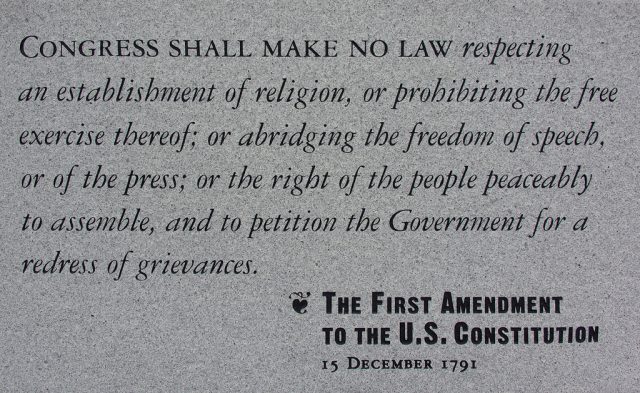
Remember how Verizon argued in 2012 that net neutrality rules violate its First and Fifth Amendment rights?
While Verizon itself isn't challenging the Federal Communications Commission's latest net neutrality order, AT&T and the other Internet service providers that are suing the FCC have resurrected this argument.
In a statement of issues that AT&T intends to raise when the case moves further into the court process, the company said last week that it plans on challenging whether the FCC’s net neutrality order "violates the terms of the Communications Act of 1934, as amended, and the First and Fifth Amendments to the US Constitution." The First and Fifth Amendment will be used to attack the FCC's decision to reclassify both fixed and mobile broadband as common carrier services, as well as the FCC's assertion of authority over how ISPs interconnect with other networks.
CenturyLink also raised the First and Fifth Amendments in its statement of issues, as did CTIA-The Wireless Association and the United States Telecom Association.
Cable companies diverged from the telcos here, with the American Cable Association challenging only on Fifth Amendment grounds, while the National Cable & Telecommunications Association didn't mention any Constitutional amendments.
While the ISPs didn't provide their full reasoning in the filings, Verizon claimed in 2012 that net neutrality "violates the First Amendment by stripping [ISPs] of control over the transmission of speech on their networks. And it takes network owners’ property without compensation by mandating that they turn over those networks for the occupation and use of others at a regulated rate of zero, undermining owners’ multi-billion dollar-backed expectations that they would be able to decide how best to employ their networks to serve consumers and deterring network investment."
While the First Amendment protects freedom of speech, the Fifth says that "[n]o person shall be... deprived of life, liberty, or property, without due process of law; nor shall private property be taken for public use, without just compensation."
In the earlier case, Verizon ultimately did get the FCC's prohibitions on blocking or discriminating against Internet content overturned, but not on Constitutional grounds. Instead, the appeals court ruled that the FCC erred by imposing per se common carrier regulations on companies that it had not classified as common carriers. The FCC fixed that in its latest vote by reclassifying them.
AT&T et al said they will also argue that the FCC's ruling "is based on an unreasonable interpretation" of Title II of the Communications Act, which regulates common carriers. They will also argue that the FCC violated the Administrative Procedure Act (APA). The NCTA said it will argue that the FCC violated "the APA’s procedural requirements by failing to provide notice and an opportunity to comment on critical features of the Order that the FCC ultimately adopted."
reader comments
129